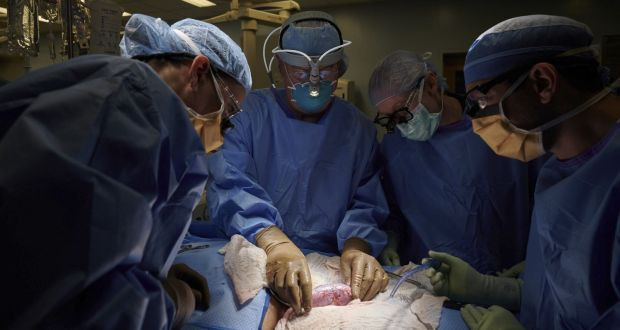Health
US Surgeons Successfully Attached A Pig Kidney To A Human Being And It Worked

Surgeons in the United States of America have successfully attached a pig’s kidney to a human body and watched it begin to work.
Infoexpert24 understands that this is a step in the decades-long quest to one day use animal organs for life-saving transplants.
The procedure done at NYU Langone Health in New York City involved the use of a pig whose genes had been altered so that its tissues no longer contained a molecule known to trigger an almost immediate rejection, according to the Reuters news agency which reported on the news on Tuesday.
The recipient was a brain-dead patient with signs of kidney dysfunction whose family consented to the experiment before she was due to be taken off life support.
For three days, the new kidney was attached to her blood vessels and maintained outside her body, giving researchers access to it.
US Surgeons Successfully Attached A Pig Kidney To A Human Being And It Worked
The researchers tracked the results for just 54 hours, and many questions remained to be answered about the long-term consequences of such an operation. The procedure will not be available to patients any time soon, as there are significant medical and regulatory hurdles to overcome.

Dr. Robert Montgomery is director of the N.Y.U. Langone Transplant Institute in Manhattan Photo Credit: Nytimes
Still, experts in the field hailed the surgery as a milestone.
Test results of the transplanted kidney’s function “looked pretty normal,” said transplant surgeon Dr. Robert Montgomery, who led the study.
The kidney made “the amount of urine that you would expect” from a transplanted human kidney, he said, and there was no evidence of the vigorous, early rejection seen when unmodified pig kidneys are transplanted into non-human primates.











![Crowd Chant 'F**k Joe Biden' At UFC Event In New York's Madison Square [VIDEO]](https://i0.wp.com/infoexpert24.com/wp-content/uploads/2021/11/F-Joe-Biden-Chant.jpg?resize=400%2C240&ssl=1)
![Crowd Chant 'F**k Joe Biden' At UFC Event In New York's Madison Square [VIDEO]](https://i0.wp.com/infoexpert24.com/wp-content/uploads/2021/11/F-Joe-Biden-Chant.jpg?resize=80%2C80&ssl=1)











